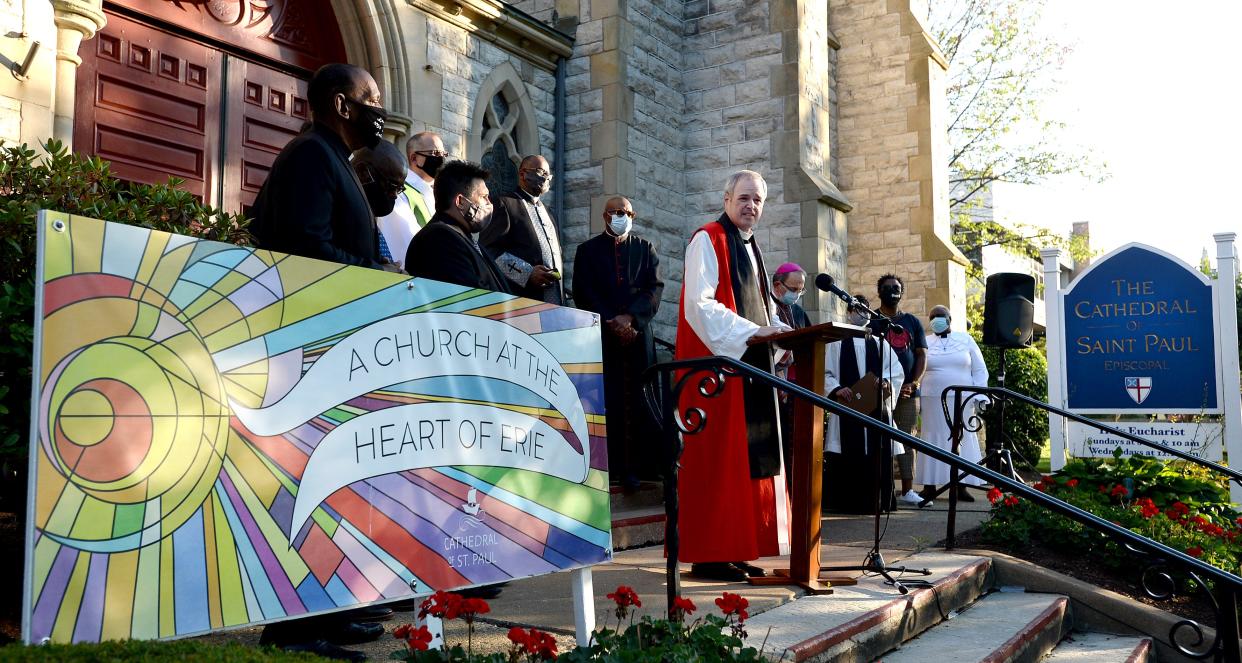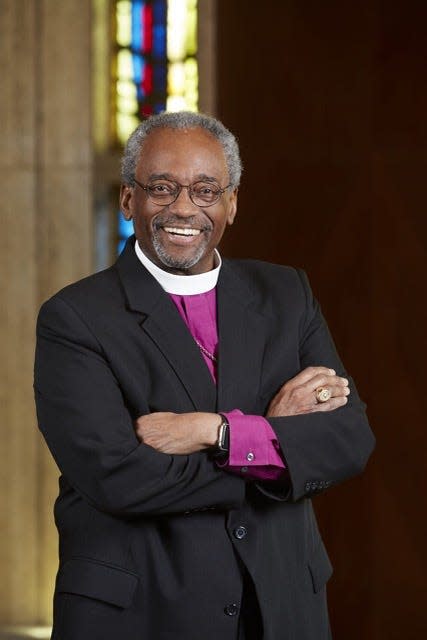Erie Bishop Sean Rowe named 1 of 4 nominees for presiding bishop of Episcopal Church
The Right Rev. Sean Rowe, bishop of the Erie-based Episcopal Diocese of Northwestern Pennsylvania, is one of four nominees to succeed the Episcopal Church's Presiding Bishop Michael Curry.
Curry, who preached at the royal wedding of Meghan Markle and Prince Harry, is nearing the end of his nine-year term. A new presiding bishop is expected to be elected in June and begin a nine-year term on Nov. 1.
"I am honored to be among the bishops who will stand for election at General Convention in June," Rowe wrote in a letter on his diocese website to members of the Episcopal Dioceses of Western New York and Northwestern Pennsylvania.
In 2018, the Erie-based diocese and the Tonawanda-based diocese voted to begin an experiment, noted as the first of its kind in the Episcopal Church, to share a bishop and staff. The dioceses, which have a combined total of more than 80 congregations, are to vote in 2025 on whether to continue the partnership, which has been led by Rowe.
Who are the other nominees?
In addition to Rowe, the nominees for presiding bishop are: the Right Rev. J. Scott Barker, bishop of the Episcopal Diocese of Nebraska; the Right Rev. Daniel G. P. Gutiérrez, bishop of the Norristown-based Episcopal Diocese of Pennsylvania; and the Right Rev. Robert Wright, bishop of the Episcopal Diocese of Atlanta.
Links to biographies of all four are available on the Episcopal Church's Office of Public Affairs website.
In keeping with the protocol of previous presiding bishop elections, the nominees will not be available for media interviews, according to the Office of Public Affairs.
Who is Sean Rowe?
Rowe was elected bishop of the Diocese of Northwestern Pennsylvania in May 2007 when he was only 32 years old, making him the youngest bishop in the Episcopal Church. He held that distinction for nearly a dozen years.
2023 Opinion: How do we answer for Erie's gun violence? A Holy Week reflection by Bishop Rowe
He became bishop provisional of Western New York in 2019 and previously served as bishop provisional of the Diocese of Bethlehem from 2014 until 2018, according to his biography on the website for the Northwestern Pennsylvania and Western New York dioceses.
Rowe was born in Sharon and graduated in 1997 from Grove City College, where he majored in history and minored in religion. He had grown up a Methodist but joined the Episcopal Church in college, according to a 2007 Erie Times-News story. He graduated from Virginia Theological Seminary in 2000 and was serving St. John's Episcopal Church in Franklin when he was elected bishop.

An Eagle Scout, he was elected class president in high school, won a four-year term on the Franklin Area School Board in 2003 and was selected as bishop on the first ballot in 2007.
Three years later, he made public four claims of sexual abuse against a former bishop of the Episcopal Diocese of Northwestern Pennsylvania, apologized for the abuse and asked other victims to come forward.
In 2012, Rowe announced that he would allow clergy in the 13-county Erie-based diocese to bless the unions of same-sex couples.
Opinion: Bishop Sean Rowe: Turning away refugees violates Christian principles
In 2014, he received a Ph.D. in organizational learning and leadership from Gannon University.
Rowe and his wife, Carly Rowe, a Christian educator, have an 11-year-old daughter, Lauren Rowe, according to his biography.
How were nominees selected?
In May 2023, a nominating committee invited members of the Episcopal Church to suggest bishops for consideration for presiding bishop. Bishops could also nominate themselves but none did, according to the Office of Public Affairs.
Bishops whose names were submitted were invited to enter the discernment process and those who agreed provided biographical information, references, and written and video responses to questions. They were interviewed via Zoom. In January, the committee chose to meet with some bishops in-person during a March retreat and discerned its slate of nominees at the close of that gathering, according to information from the Office of Public Affairs.

What happens next?
Tuesday's announcement of the four nominees opens a 13-day period during which any bishop or deputy to the 81st General Convention may indicate their desire to nominate a bishop not on the committee’s slate, according to the Office of Public Affairs.
All nominees will address the Episcopal Church's General Convention attendees on June 21.
The church's House of Bishops will vote for a new presiding bishop on June 26 and the House of Deputies, which includes clergy and lay people from the dioceses, will then be asked to confirm the election.
Dana Massing can be reached at dmassing@timesnews.com.
This article originally appeared on Erie Times-News: Erie, PA Bishop Rowe nominated for Episcopal Church presiding bishop
